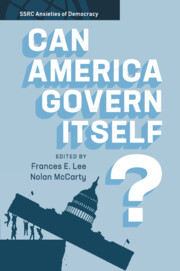Book contents
- Can America Govern Itself?
- SSRC Anxieties of Democracy
- Sponsored by the Social Science Research Council
- Can America Govern Itself?
- Copyright page
- Contents
- Acknowledgments
- 1 The Anxieties of American Democracy
- Part I Anxieties of Power, Influence, and Representation
- Part II Procedural Anxieties
- Part III Anxieties of Governance
- 10 Public Policy and Political Dysfunction
- 11 The Effects of Partisan Polarization on the Bureaucracy
- 12 Polarization and the Changing American Constitutional System
- 13 Democratic Anxieties
- Index
- Index Authors
- References
13 - Democratic Anxieties
Present and Emergent
from Part III - Anxieties of Governance
Published online by Cambridge University Press: 25 May 2019
- Can America Govern Itself?
- SSRC Anxieties of Democracy
- Sponsored by the Social Science Research Council
- Can America Govern Itself?
- Copyright page
- Contents
- Acknowledgments
- 1 The Anxieties of American Democracy
- Part I Anxieties of Power, Influence, and Representation
- Part II Procedural Anxieties
- Part III Anxieties of Governance
- 10 Public Policy and Political Dysfunction
- 11 The Effects of Partisan Polarization on the Bureaucracy
- 12 Polarization and the Changing American Constitutional System
- 13 Democratic Anxieties
- Index
- Index Authors
- References
Summary
This volume grows out of the well-documented psychological impulse to bring information to bear on sources of anxiety. In politics, as in other realms of life, anxiety triggers a quest for information. Perceived threats focus the attention (Marcus, Neuman, and MacKuen, 2000). Anxious citizens take more interest in politics, have more motivation to learn, and weigh the information they collect more judiciously (Marcus and MacKuen, 1993, MacKuen et al, 2010, Albertson and Gadarian, 2015). In these respects, worried citizens are better citizens (Brader, 2005, Valentino et al, 2008).
- Type
- Chapter
- Information
- Can America Govern Itself? , pp. 238 - 344Publisher: Cambridge University PressPrint publication year: 2019



